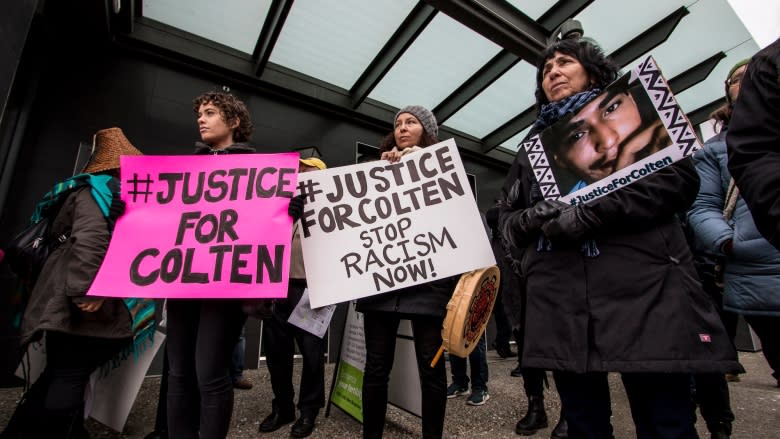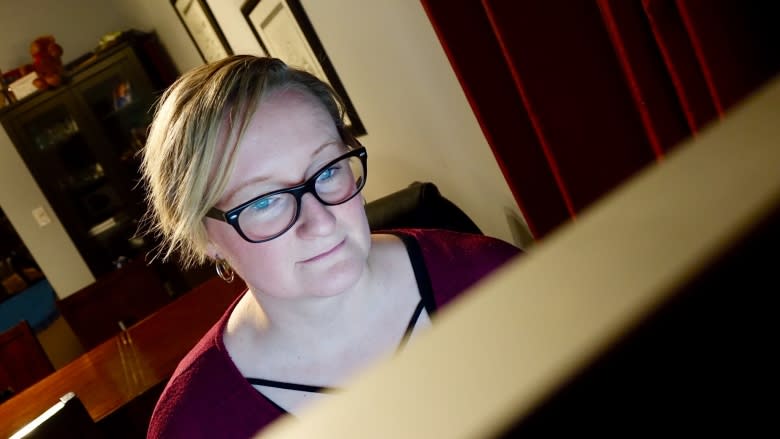Boushie verdict fallout sparks allegations of threats, harassment
An online fundraiser for Gerald Stanley, the Saskatchewan farmer found not guilty in the shooting death of Colten Boushie, has stirred up an online war of words as well as threats against an Ottawa woman.
The crowdfunding campaign, which has raised more than $200,000, began after the high-profile trial.
Earlier this month, a jury acquitted Stanley, 56, of second-degree murder. Boushie, 22, was shot and killed after he and four others from the Red Pheasant Cree Nation drove onto Stanley's rural property near Biggar, Sask., in August 2016.
The verdict sparked protests across the country, and a rally in Ottawa on Parliament Hill in support of the Boushie family that was organized by Miranda Dyck.
Dyck said she has filed a report with police after being bombarded with harassing phone calls, threats and hate mail after she singled out people online for donating money to the Stanley crowdfunding campaign.
"They're angry. They want me to shut up. It's definitely a concern," said Dyck. "It's easy to say they're just cowardly empty threats. But if you get enough of them, there may be one person who is motivated to actually act."
Conversely, some have accused Dyck of doxing — the act of posting a person's personal information online against that person's wishes.
Dyck had included some donors' hometowns and places of employment to her tweets, and called for boycotts of some donors' workplaces.
In a statement, Pioneer Co-op suspended an employee after he was centred out in one of Dyck's tweets.
Threats escalated
Dyck, whose husband and children are Indigenous, said she was shocked when she learned of the campaign to cover Stanley's legal bills and lost farm revenue. She has been pushing to have the page removed.
GoFundMe told CBC in a statement, "Given the jury verdict, the campaign for Mr. Stanley does not violate our terms of service." The campaign organizers turned off the public comments.
Dyck said she turned to Twitter to start a discussion. But one of the people Dyck singled out online disagrees.
"I really don't see how someone can judge me as a person and what I support without ever talking to me, without knowing me," said Curtis Stachniak. "She's just going by a donation I made by a GoFundMe page."
Stachniak, 39, is a self-employed mechanic in Prince Albert, Sask. Most of his customers are farmers and he runs a small hay farm himself. He suggested the idea of a GoFundMe page for Stanley on a farm equipment Facebook group, and within a few minutes ,another member created it.
Stachniak was the first to donate and then found himself identified in one of Dyck's tweets.
Stachniak said he called Dyck at work hoping to talk to her about the post. When he didn't reach her, he tried to file a complaint with her employer about her activity on social media.
"She's basically saying that I support people that kill young Indigenous men — which I do not," said Stachniak. "I don't like being called a racist … I personally feel for the family of Colten Boushie. A young man died. He shouldn't have. What happened was a tragedy for both sides."
Stachniak said he has since received a handful of vulgar messages from people and is concerned Dyck's post will live online forever, potentially harming his future employment.
'I hope someone breaks into your house'
Others have taken their anger against Dyck offline and started calling her directly over concerns she's destroying people's reputations.
In one day alone, Dyck said her work phone rang every 20 minutes, adding up to roughly 50 calls. More than 10 men left voice messages from as far away as Saskatchewan and Australia.
"A lot of it is intended to humiliate, and demean me, and attack me as a woman and as a person," said Dyck. "Then it just escalated from there into threats."
CBC News has listened to the voice messages that include derogatory language.
"Pretty spineless bitch, eh," said one anonymous caller. "I think you've got some explaining to do if you're going to put everyone's name on Facebook, Miranda Dyck. Good to know that we know where you are.... You ain't too smart, girl."
Another phone message said, "You play a man's game. You pay a man's price. Don't forget that."
The dozens of online messages to Dyck went further, detailing violent threats and warning they would post her home address online.
Dyck said it's "deeply ironic" people are saying she's harassing them, when she's being targeted as well.
"It really floors me that they're accusing me of harassment, given that they're calling me every 20 minutes," said Dyck.
Tensions are high
Ottawa-based lawyer Richard Warman, who is active in human rights law, said this case confirms tensions are running high after the Boushie case.
"It's the era where people have this illusion of anonymity on the internet and just open the tops of their skulls and let the demons out," said Warman.
"Generally people have the sense that, 'I can do anything on the internet.' That's just simply not the case. What's unlawful in real life is unlawful online."
Warman sees no issues with calling attention to someone's public utterances online or potentially where they work. But he also said it's problematic to mention family members who aren't involved — and it's also a criminal offence to threaten violence.




